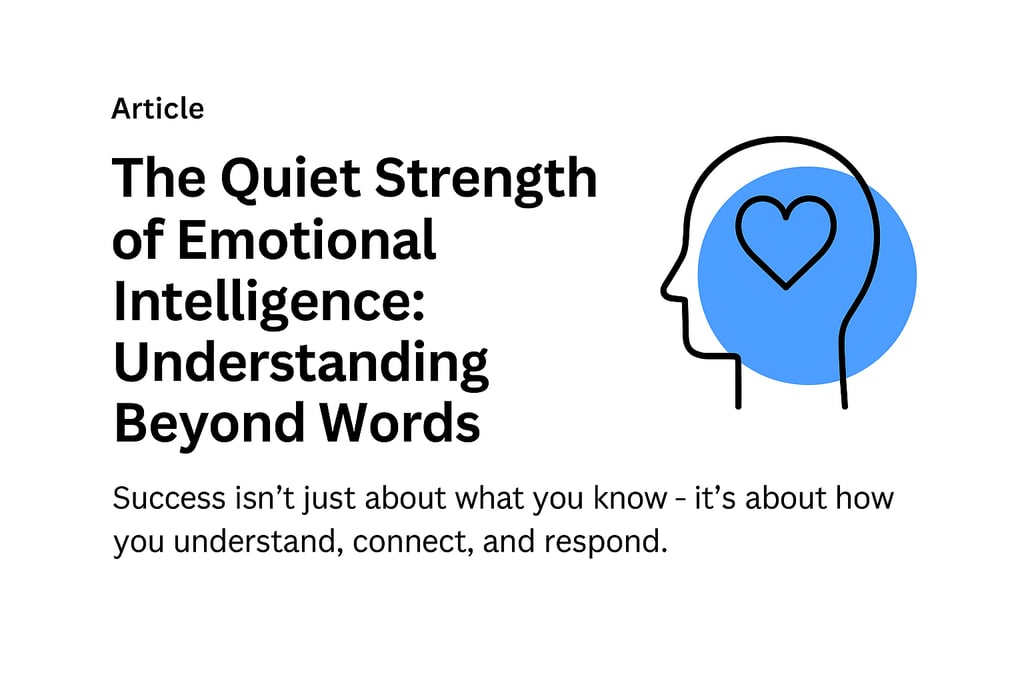The Quiet Strength of Emotional Intelligence: Understanding Beyond Words
Success isn’t just about what you know — it’s about how you understand, connect, and respond.
GROW WITH ANDHIKA
Grow with Andhika Team
10/12/20253 min read


Intelligence may open doors, but emotional intelligence determines how long you’ll stay inside.
The Missing Piece in Modern Intelligence
In today’s world, information is abundant. Data, knowledge, and analysis are everywhere. We can measure IQ, track performance, and automate decisions.
But despite all this progress, something still feels incomplete.
Many workplaces suffer from burnout, poor communication, and constant misunderstandings. Teams crumble not because people lack knowledge, but because they lack connection.
That’s where emotional intelligence (EQ) steps in — not as a “nice-to-have,” but as a core skill for navigating the modern world.
What Emotional Intelligence Really Is
Emotional intelligence isn’t about being overly sensitive or agreeable.
It’s the capacity to understand emotions — both yours and others’ — and to use that understanding to guide behavior.
Psychologist Daniel Goleman famously divided EQ into five key components:
Self-awareness — understanding your emotions, triggers, and strengths.
Self-regulation — managing your reactions instead of being ruled by them.
Motivation — staying driven by purpose, not just reward.
Empathy — recognizing and relating to the emotions of others.
Social skills — building healthy relationships through trust and communication.
In essence, emotional intelligence is the bridge between what you know and how you act.
Why EQ Matters More Than Ever
In a world where automation is rising and technical skills evolve every year, emotional intelligence remains timeless.
Machines can analyze data faster than we ever could — but they can’t comfort a colleague, inspire a team, or resolve a conflict with empathy.
In workplaces:
Leaders with high EQ inspire trust, loyalty, and psychological safety.
Teams with emotional awareness collaborate better and recover faster from tension.
Employees with empathy build stronger networks and customer relationships.
And in personal life, EQ allows us to manage stress, maintain boundaries, and build meaningful connections — skills that quietly determine long-term happiness.
The Cost of Emotional Blindness
Ignoring emotional intelligence comes with a price.
Without awareness, frustration builds. Miscommunication escalates into conflict.
When leaders dismiss emotions as “unprofessional,” they lose the very essence of what drives humans — belonging, purpose, and recognition.
We’ve all seen it: brilliant people who fail to lead because they can’t listen.
Talented teams that collapse under ego.
Relationships that end not from lack of love, but lack of understanding.
Emotional blindness — the inability to read the room, control impulses, or show empathy — can silently derail success faster than any lack of skill.
How to Cultivate Emotional Intelligence
Building EQ isn’t about changing who you are — it’s about becoming more aware of how you show up in different situations.
🧭 1. Practice self-observation
Pause before reacting. Ask yourself, What am I feeling right now, and why? This one question can stop emotional autopilot and open space for better choices.
💬 2. Listen to understand, not to reply
During conversations, focus on what’s being said — and what’s not being said. Pay attention to tone, body language, and pauses. Curiosity builds connection.
🌊 3. Regulate, don’t suppress
Emotional intelligence isn’t about ignoring feelings. It’s about expressing them thoughtfully, not explosively. Anger can signal injustice; fear can signal caution — if managed wisely.
🤝 4. Lead with empathy
When people make mistakes, start with understanding before judgment. Ask what pressures they’re facing. Empathy doesn’t mean excusing errors — it means addressing causes, not just symptoms.
🌱 5. Keep learning from feedback
Feedback is a mirror. Even uncomfortable criticism can help refine how we communicate and relate. Respond with gratitude, not defense.
Emotional Intelligence in Action
In leadership, EQ turns authority into influence.
In teams, it transforms competition into collaboration.
In life, it turns misunderstanding into growth.
Consider a manager who notices tension in a meeting. Instead of ignoring it, she pauses, asks how everyone feels, and acknowledges the pressure. The atmosphere softens — not because she solved the problem, but because she recognized the emotion.
Or think of a colleague who stays calm when plans collapse, offering reassurance instead of blame. That quiet steadiness often inspires more confidence than a grand motivational speech ever could.
These moments may seem small, but they define the emotional culture of a workplace — or even a relationship.
The Future Belongs to the Emotionally Intelligent
As we move deeper into an era shaped by AI, automation, and remote work, human connection becomes our most valuable advantage.
The ability to lead, collaborate, and empathize will separate those who simply survive from those who inspire.
Emotional intelligence will not replace technical skill — it will amplify it.
Because intelligence without empathy leads to cold efficiency, while empathy without intelligence leads to chaos.
Balance both, and you create impact that lasts.
Final Thought
Emotional intelligence is not loud. It doesn’t demand attention.
It works quietly — in patience, in understanding, in the pause before a reaction.
And maybe that’s its greatest strength:
While others rush to speak, the emotionally intelligent person listens.
While others react, they respond.
While others aim to impress, they aim to connect.
In the end, success isn’t built only by what we know — but by how deeply we understand ourselves and the people around us.

Business hours
Monday — Friday
9am — 6pm
Address
Jakarta, 12930, Indonesia
Bekasi, 17411, Indonesia
Contacts
+62 811-1008-8188
cs@andhco.com
